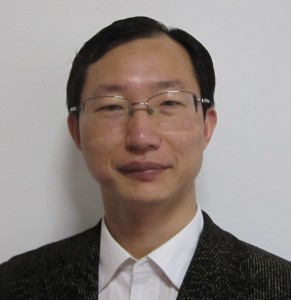 Dr. Youliang Zhao was born in Shuangfeng County, Hunan Province, China, in September 1975. He received B.Sc. (1997) and M.Sc. (2000) degrees from Xiangtan University and Ph.D. in July 2003 at Institute of Chemistry, the Chinese Academy of Sciences with Prof. Fu Xi. He went to Tokyo Institute of Technology in November 2003 and worked as a JSPS Postdoctoral Fellow with Prof. Akira Hirao. From November 2005 to August 2007, he was a postdoctoral research fellow with Dr. Sébastien Perrier at University of Leeds. He became a full professor at College of Chemistry, Chemical Engineering and Materials Science, Soochow University since August 2007. He has published more than 50 peer reviewed research papers in scientific journals primarily on synthesis of complex macromolecular architectures, hybrid materials and nanocomposites by polymerization techniques such as controlled radical polymerization (CRP), ring-opening polymerization (ROP) and living anionic polymerization (LAP) and their combination with highly efficient coupling reactions. He has been invited to give lectures on his research work in international conferences as well as in some research institutions. His research interests include synthesis and properties of stimuli-responsive inorganic-organic hybrid materials, graphene-polymer nanocomposites, and functional polymers involving dendrimers, block, star, graft and hyperbranched polymers.
Dr. Youliang Zhao was born in Shuangfeng County, Hunan Province, China, in September 1975. He received B.Sc. (1997) and M.Sc. (2000) degrees from Xiangtan University and Ph.D. in July 2003 at Institute of Chemistry, the Chinese Academy of Sciences with Prof. Fu Xi. He went to Tokyo Institute of Technology in November 2003 and worked as a JSPS Postdoctoral Fellow with Prof. Akira Hirao. From November 2005 to August 2007, he was a postdoctoral research fellow with Dr. Sébastien Perrier at University of Leeds. He became a full professor at College of Chemistry, Chemical Engineering and Materials Science, Soochow University since August 2007. He has published more than 50 peer reviewed research papers in scientific journals primarily on synthesis of complex macromolecular architectures, hybrid materials and nanocomposites by polymerization techniques such as controlled radical polymerization (CRP), ring-opening polymerization (ROP) and living anionic polymerization (LAP) and their combination with highly efficient coupling reactions. He has been invited to give lectures on his research work in international conferences as well as in some research institutions. His research interests include synthesis and properties of stimuli-responsive inorganic-organic hybrid materials, graphene-polymer nanocomposites, and functional polymers involving dendrimers, block, star, graft and hyperbranched polymers.
Please follow the link for further information on Zhao’s research group: http://www.polymer.cn/ss/zhaoyouliang/index.html or http://chemistry.suda.edu.cn/index.aspx?lanmuid=69&sublanmuid=603&id=65
What was your inspiration in becoming a chemist?
I become a chemist because of my strong interest in chemistry. Our chemistry teachers in high school always encouraged us to do some interesting chemistry experiments, which fully inspired my curiosity. The undergraduate and graduate studies further underlay my background in polymer science. I am so lucky to become a chemist that I am able to design and synthesize novel compounds and polymers, which may have potential applications in materials science and technology.
What was the motivation to write this article? (DOI:10.1039/C1PY00396H)
The motivation of this article was to develop a versatile method to prepare suprapure multicomponent block copolymers and recycle the functional solid supports. In our previous study, three types of methods comprising Z-supported RAFT graft polymerization, radical-induced chain exchange reaction, and combination of RAFT polymerization and coupling reactions were used to synthesize well-defined homopolymers and block copolymers grafted onto silica particles although the solid substrates were not recycled. In this continuous study, tandem RAFT process and CuAAC afforded better-defined block copolymer grafted silica, de-grafting process and postmodification gave access to highly pure block copolymers with terminal functionalities, and clickable silica particles were efficiently recovered until all the surface functionalities were vanished. Our study affords a versatile and general approach for surface modification, synthesis of high-purity block copolymers and recycle of clickable solid substrate, which is of great importance for “green” syntheses and development of renewable resources. We have extended this method for the fabrication of functional graphene-polymer nanocomposites.
Why did you choose Polymer Chemistry to publish your work?
Polymer Chemistry is an excellent journal which publishes high quality manuscripts in polymer science. It is natural for me to publish our best results in this journal due to its good visibility.
In which upcoming conferences may our readers meet you?
I will be in Changchun, China, during 2-6 June at the International Symposium on Polymer Chemistry (PC2012). I attend IUPAC International Conference on Novel Materials and Synthesis (NMS) & International Symposium on Fine Chemistry and Functional Polymers (FCFP) regularly and will attend NMS-VIII & FCFP-XXII to be held in Xi’An, China in October this year.
How do you spend your spare times?
When I am free, I like travelling and reading.
Which profession would you choose if you were not a scientist?
Chances are given, I may want to be a historian since the complex history always attracts me. I may also want to be a writer because of my strong interest in poem, essay and novel.










